In early 1998, some of the biggest fossil fuel companies in the world were hatching a plan to hijack the science of human-caused global warming.
Representatives from major fossil fuel corporations and industry groups had joined forces with operatives from major conservative think tanks and public relations experts to draft what they called their Global Climate Science Communications (GCSC) plan.
In a memo the plan boldly declared its goal would be to convince “a majority of the American public” that “significant uncertainties exist in climate science”.
Earlier this week it was revealed that major US coal utility Southern Company had paid scientist Dr Willie Soon, an aerospace engineer based at the Harvard-Smithsonian Center for Astrophysics, more than $400,000 in recent years for science research.
In total, Soon had received more than a million dollars from Southern Company, Exxon and the American Petroleum Institute in the last 14 years. These three key funders of Soon’s work were also involved in formulating the GCSC plan.
Soon is a popular and oft-cited scientist within climate science denialist circles and claims the sun is the key driver of climate change with fossil fuels playing a minimal role.
But climate scientists have repeatedly dismissed his views, which are at odds with science academies around the world. Soon has previously stated that his fossil fuel funding does not influence his scientific work.
One of Soon’s contacts at Southern Company was the now retired Robert Gehri, one of the original dozen people behind the plan.
The plan was developed during the early months of 1998, which went on to be declared the hottest on record by the US National Oceanic and Atmospheric Administration.
A study has found that in the scientific literature published in 1998 there were 96 papers on global warming that agreed that humans were the main cause, versus only three that disagreed.
The goals of the fossil fuel industry’s plan were clear, ambitious and well articulated. Gehri told the Guardian the plan was “never implemented” but analysis for this report suggests many of the suggested tactics were rolled out in subsequent years.
With an overall budget of $2m (£1.3m) the plan would look to reshape the view of climate change science among the public and policy makers in a way that would favour the industries that stood to lose the most from regulations limiting greenhouse gas emissions.
The investigation published here, with support from DeSmogBlog and the Climate Investigations Center (CIC), finds many of those involved are still trying to convince politicians, legislators and the public that the science is faulty or can be largely ignored.
Kert Davies, a former Greenpeace researcher and founder of CIC, said: “We now have evidence through the Willie Soon documents that ExxonMobil, Southern Company and the American Petroleum Institute, who were in the room in 1998, carried on with elements of the plan, even after it was leaked and on the front page of the New York Times.
“The 1998 plan is very detailed and talks about moving money to support this campaign through free-market anti-regulation NGOs like the American Legislative Exchange Council (Alec). It names multiple front groups and organisations which we know ExxonMobil and the Koch Foundations supported and still support.
“Impacting the voice of elected officials was a key target under the ‘Victory will be achieved’ section of the memo. Now in the US, about half our elected officials are climate deniers or are scared to even talk about the subject, so the impact of this 1998 campaign and subsequent misinformation campaigns around climate science is still clearly holding us back from climate policy solutions.”
So what of the 12 members of the team who wanted to reshape the world’s perception of the risks of human-caused climate change?
Robert Gehri
Then: Gehri was a research specialist at Southern Company, a major US coal electricity utility company. In November 1998, Gehri was listed as an observer at the UN climate change negotiations in Buenos Aires on the delegation of the Climate Council, a group fronted by the late Don Pearlman, once described as “the high priest of the carbon club” for his alliances with oil-producing countries at climate change negotiations.
Now: Gehri took on a new role at Southern Company as a “climate change issues manager” after 1998. Gehri was listed as an attendee at UN climate change negotiations in 2005 in Montreal, 2006 in Germany, 2007 in Indonesia, 2008 in Poland, and 2009 in Germany and his attendance was always as part of a delegation from the Edison Electric Institute, an association representing US investor-owned electricity utility companies.
Documents released from the Smithsonian Astrophysical Laboratory show that in 2008 Gehri was the Southern Company director responsible for negotiating a $60,000 grant to the laboratory to pay for research by climate sceptic scientist Dr Willie Soon.
Gehri told The Guardian: “I vaguely remember the story but the plan was never implemented and I believe most everyone associated with that has long since retired. I retired six years ago and really have no opinion on that story anymore. I’m retired and I don’t comment on that stuff - it was 20 years ago and there’s really no point.”
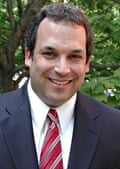
David Rothbard
Then: Rothbard was co-founder and president of the climate denial group Committee for a Constructive Tomorrow (Cfact).
Now: Rothbard is still Cfact’s president. In June 2014, he wrote that president Barack Obama’s regulations calling for cuts to emissions from power plants to help slow climate change were based on “nothing but assumptions, faulty computer models and outright falsifications”. Cfact continues its campaign of climate science denial to this day, most recently giving a presentation at the 2014 Alec annual meeting with handouts titled “Climate Change Talking Points 2014” (Alec is also named in the 1998 memo as a “potential fund allocator”.)
Emails to Cfact and Rothbard went unanswered.
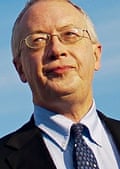
Myron Ebell
Then: Ebell was a policy director at Frontiers of Freedom working on property rights, the Endangered Species Act, federal lands policies and global warming.
Now: Ebell is the director of energy and global warming policy at the Competitive Enterprise Institute (CEI) and continues to be a prominent global warming sceptic, appearing as a pundit on US television networks and writing media columns. In December 2014 Ebell reportedly claimed delegates from poorer nations were motivated to attend UN climate talks for the daily payments and the chance to take their wives to nice locations.
Emails to Ebell and the CEI went unanswered.
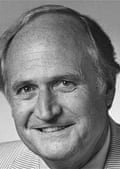
John Adams
Then: Former journalist John Adams was the founder of John Adams Associates, a Washington-based public relations firm. In the early 1970s, Adams was public affairs director in president Richard Nixon’s price commission. According to his archived company profile, Adams also worked as a documentary writer and news producer at CBC and ABC and had worked with legendary broadcaster Walter Cronkite. In 2008, Adams’ firm merged with Kellen Company.
John Adams died in December 2012.
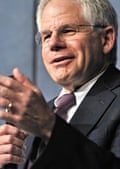
Jeffrey Salmon
Then: Salmon was executive director at the George C Marshall Institute think tank, serving there between 1991 and 2001. Before joining the institute, Salmon had been a senior speechwriter for Dick Cheney during his tenure as defense secretary.
Now: Three years after being part of the GCSC team, Salmon joined the US Department of Energy. He is currently deputy director of resource management in the department.
Emails to the department for the attention of Salmon went unanswered.
Lee Garrigan
Then: Garrigan was affiliated with the Environmental Issues Council. The now defunct EIC was formed in 1993 by a number of trade associations “who saw the need to explore common sense solutions to widely-debated environmental problems”.
Those associations included the National Cattlemen’s Beef Association, American Pulpwood Association and the Independent Petroleum Association of America.
Now: Garrigan went on to work at the Environmental Council of the States, a “non-partisan association of state and territorial environmental agency leaders”. Ms Garrigan no longer works at ECOS.
The Guardian contacted Garrigan but she declined to comment on the record. The Guardian understands her role in the plan was minimal.
Joseph L Walker
Then: Joe Walker was a public relations consultant working on behalf of the American Petroleum Institute. Walker had a co-ordinating role with the group.
Now: Walker went on to establish his own public relations consultancy, with clients from the chemical and plastics industries. These included the American Chemistry Council, the Chlorine Institute and the Formaldehyde Council. A blog post written by Walker in November 2014 suggests he continues to work in public relations.
Emails to Walker asking about his role in the GCSC plan went unanswered.
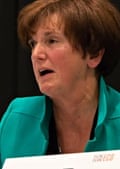
Sharon Kneiss
Then: Kneiss was federal relations manager for oil and gas company Chevron Corp. In 1999, Kneiss represented Chevron at a Washington business meeting to discuss the United Nations Clean Development Mechanism, where she was discussing how Chevron was hopeful that a West African gas pipeline project may qualify for carbon reduction credits. Kneiss also represented Chevron at that year’s major UN climate conference in Bonn, Germany.
Now: Kneiss is now the President and CEO of the National Waste and Recycling Association (NWRA), after stints at the American Chemistry Council, American Forest and Paper Association and American Petroleum Institute.
The NWRA’s climate change web page says there has been “a significant increase in atmospheric concentrations of greenhouse gases” in the last two decades, and that: “Scientific consensus is clear: these emissions are making the earth warmer in an unusually fast time period.”
Kneiss told The Guardian: “At the time, I worked for Chevron and we took a constructive approach to the climate issue. While the debate on climate continued, we looked at viable opportunities to mitigate any impacts.”
She said Chevron had worked with developing country representatives and sponsored workshops to discuss carbon reduction schemes.
She added: “I attended the first meeting that Joe Walker called concerning the development of his plan. We chose not to participate with that effort.”

Steve Milloy
Then: A year earlier in March 1997, Milloy became the executive director of the tobacco-industry front group The Advancement of Sound Science Coalition.
Now: Milloy has continued to describe the science linking fossil fuel emissions and climate change as “junk”. Milloy is now the director of external policy and strategy at Murray Energy Corporation, the largest privately-held coal company in the US. In a speech last year, Milloy said US energy policies to cut greenhouse gas emissions from power stations were based on “eco myths and junk science”.
Emails to Milloy and Murray Energy went unanswered. The Guardian received a response to the email addressed to Mr Milloy from Lord Christopher Monckton, a prominent climate science sceptic, who said it was “untrue” and “statistically meaningless” to claim the 15 hottest years on record had occurred from 1998 onwards.
Lynn Bouchey
Then: Bouchey, also known as L Francis Bouchey, was the director of a project known as Citizens for Sound Science and the Environment, based at the think tank Frontiers of Freedom. The think tank was founded by former Republican senator Malcolm Wallop. At the time the project was attacking the UN Kyoto climate treaty and casting doubt on the risks of human-caused climate change.
Now: In 2001, Sourcewatch reports that Bouchey, Wallop and Frontiers of Freedom ran an “eco-terrorism” propaganda campaign against Rainforest Action Network (RAN), Greenpeace and other groups, eventually petitioning the Internal Revenue Service (IRS) to revoke RAN’s non-profit tax status.
In 2004 Bouchey joined oil company Shell where, according to his LinkedIn profile, he worked in “government relations and community relations”. US government lobby registers show Bouchey listed as a lobbyist for Shell between 2005 and 2007. Bouchey’s online profile says he is retired.
The Guardian was unable to locate contact details for Bouchey.
Peter Cleary
Then: Cleary was the communications manager at Americans for Tax Reform, a think tank founded by influential conservative Grover Norquist.
Now: In October 2000 Cleary joined the trade group Grocery Manufacturers of America (now renamed the Grocery Manufacturers Association) as manager, public policy communications.
In 2003 Cleary was named deputy director of the American Conservative Union with a role to organise the annual Conservative Political Action Conference (CPAC) conference. The Guardian was unable to find further information about Mr Cleary or make contact with him.
Randy Randol
Then: Randol was the senior environmental advisor for Exxon Corporation, based in Washington DC. Randol, also known as Arthur G Randol III, had worked for the corporation since 1979.
Now: Randol is now listed as the president of the American Energy Freedom Center.
In 2001, Randol lobbied the Bush administration to pressure the Intergovernmental Panel on Climate Change (IPCC) to replace its chair Robert Watson, who Randol said had a “personal agenda”. Randol also recommended the Bush administration replace “Clinton/Gore carry-overs” who had “aggressive agendas” with sceptical scientists Richard Lindzen and John Christy. Randol retired from Exxon in 2003. He still works as an advisor in the energy industry.
He has contributed to reports on energy policy for the National Coal Council and Business Roundtable. He represents Peabody Energy on the Southern States Energy Board and is an advisor to oil and gas developer Green Century Resources. In January 2015, Randol was reportedly acting as a consultant for the Virginia Tea Party Patriots Federation speaking against a president Obama plan to reduce greenhouse gas emissions from power stations.
Emails to Randol went unanswered.
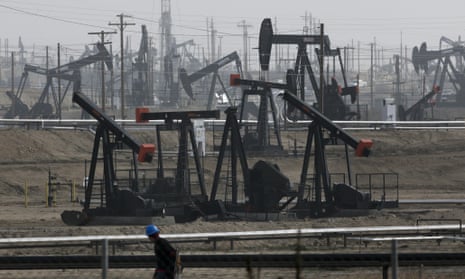
Comments (…)
Sign in or create your Guardian account to join the discussion